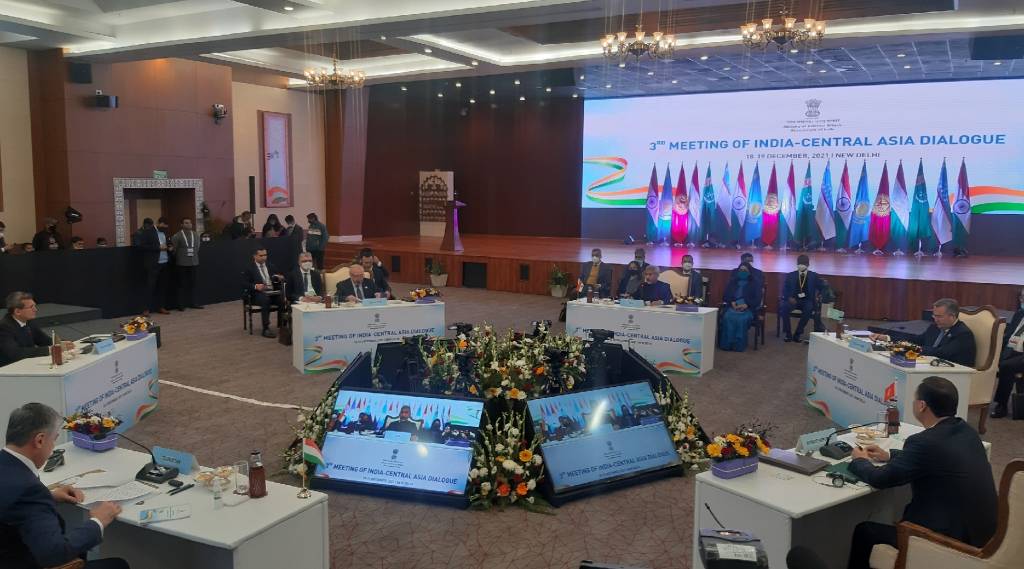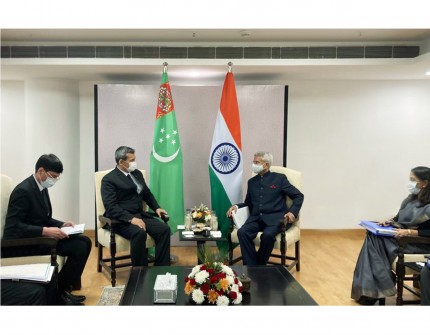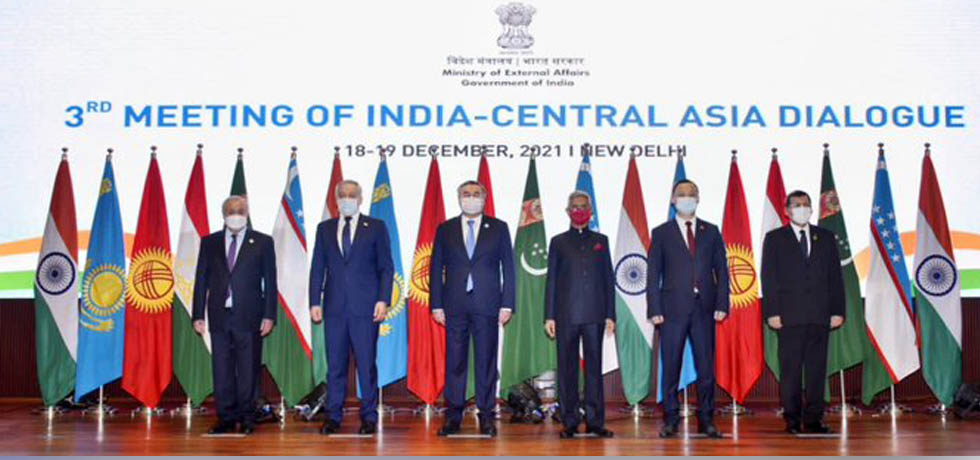Эльвира Кадырова
19 декабря в столице Индии Нью-Дели состоялась третья встреча министров иностранных дел диалога «Индия-Центральная Азия.
Делегацию Туркменистана возглавил Заместитель Председателя Кабинета Министров Туркменистана, Министр иностранных дел Туркменистана Рашид Мередов.
Во встрече приняли участие министр иностранных дел Индии Субраманьям Джайшанкар, министр иностранных дел Казахстана Мухтар Тлеуберди, министр иностранных дел Кыргызской Республики Руслан Казакбаев, министр иностранных дел Таджикистана Сироджиддин Мухриддин, министр иностранных дел Узбекистана Абдулазиз Камилов.
Стороны высоко оценили роль диалога между Индией и странами Центральной Азии как эффективной платформы для укрепления многогранного сотрудничества и обмена мнениями по различным региональным и международным вопросам, представляющим взаимный интерес.
Было подчёркнуто, что такой формат сотрудничества между странами способствует региональному миру, безопасности, стабильности, устойчивому экономическому росту, а также процветанию в регионе.
Рашид Мередов отметил последовательное развитие взаимодействия государств Центральной Азии и Индии в политико-дипломатической, торгово-экономической, культурно-гуманитарной сферах. Подчеркивалось наличие большого потенциала сотрудничества, прежде всего, в таких секторах, как фармацевтика, информационные технологии, сельское хозяйство, энергетика, текстильная промышленность и др.
Мередов указал на необходимость дальнейшего совершенствования функционирования Диалога «Центральная Азия – Индия». В частности, был высказан ряд конкретных предложений, нацеленных на создание прочных институциональных основ нового формата политического взаимодействия Центральноазиатских стран с Индией.
В этом контексте подчеркнута важность практического осуществления конкретных предложений, высказанных в ходе Международной конференции «Политика мира и доверия – основа международной безопасности, стабильности и развития», состоявшейся в г.Ашхабаде 11 декабря 2021 года.
При этом, особо отмечена значимость инициативы Президента Туркменистана о формировании новой философии современных международных отношений, названной как «Диалог – гарантия мира».
Также глава внешнеполитического ведомства Туркменистана обратил внимание на актуальность реализуемых в настоящее время экономических проектов, призванных усилить взаимосвязанность между регионом Центральной Азии и Индией, среди которых особое место занимает проект строительства газопровода «Туркменистан –Афганистан – Пакистан – Индия» (ТАПИ).

В ходе нынешнего министериала были обсуждены перспективные направления многосторонней кооперации и вопросы повышения эффективности взаимодействия, в том числе во взаимной торговле, инвестиций, промышленности и укреплении транспортной взаимосвязанности с Индией.
Также, стороны отметили важность совместного реагирования на современные вызовы и угрозы. Проанализированы пути решения экологических проблем в регионе, предотвращения транснациональных угроз, а также укрепления культурного взаимообмена.
Министры обменялись мнениями по ситуации в Афганистане и подтвердили поддержку мирного, безопасного и стабильного развития страны, подчеркнув, при этом, уважение суверенитета, единства и территориальной целостности и невмешательство в его внутренние дела.
Стороны подчеркнули необходимость разработки постконфликтной стратегии в отношении этой страны, в целях недопущения ее международной изоляции. На полях встречи рассмотрены вопросы оказания гуманитарной помощи и содействия социально-экономическому восстановлению Афганистана.
В ходе форума была выражена обоюдная заинтересованность в сотрудничестве в сфере образования и науки, здравоохранения и медицины. Обсуждены вопросы предотвращения распространения COVID-19, отмечена необходимость продолжения совместных действий в борьбе с пандемией коронавируса и её последствиями.
Отдельный акцент был сделан на многовековых культурных и цивилизационных связях между Индией и странами Центральной Азии и подчёркнута важность развития сотрудничества в культурно-гуманитарной сфере для дальнейшей активизации контактов между народами.
По итогам Форума принято Совместное заявление министров иностранных дел Диалога «Центральная Азия – Индия».
Совместное заявление 3-го заседания Диалога Индия-Центральная Азия (на англ.яз)
Joint Statement of the 3rd meeting of the India-Central Asia Dialogue
December 19, 2021
The 3rd meeting of the India-Central Asia Dialogue was held in New Delhi on 19 December 2021 under the chairmanship of the External Affairs Minister of India. Ministers of Foreign Affairs of the Republic of Kazakhstan, Kyrgyz Republic, Republic of Tajikistan, Turkmenistan and Republic of Uzbekistan took part in the meeting.
2. External Affairs Minister of India congratulated the Foreign Ministers of Central Asian countries on the 30th anniversary of their independence. The Foreign Ministers of the Central Asian countries congratulated the External Affairs Minister of India on the ongoing celebrations of 75 years of India’s independence. The Ministers expressed their readiness to joint celebrations marking the 30th anniversary of the establishment of diplomatic relations between India and Central Asian States in 2022.
3. The Ministers underlined the civilizational, cultural, trade and people-to-people linkages between India and Central Asian countries and reaffirmed their commitment to building a comprehensive and enduring India-Central Asia partnership. They highly appreciated the role of the India-Central Asia Dialogue, as an effective platform for strengthening the multifaceted cooperation and exchanging views on various regional and international issues of mutual interest. They emphasized that establishment of long-term relations between Central Asia and India is aimed at enhancing regional peace, security, stability, sustainable economic growth and prosperity in the region. They discussed further strengthening of the India-Central Asia Dialogue and agreed to hold regular annual meetings of the Dialogue.
4. The Ministers positively assessed the steps taken by the sides to implement the decisions taken at the 1st India-Central Asia Dialogue in Samarkand in January 2019 as well as the 2nd India-Central Asia Dialogue held in the virtual format in October 2020. In this regard, they welcomed the signing of MoUs for implementation of High Impact Community Development Projects (HICDPs) for socio-economic development in Central Asian countries, based on grant assistance by India. They also welcomed the projects approved for implementation and looked forward to expeditious identification and implementation of more projects under this mechanism. They noted the ongoing discussions with regard to utilization of US$ 1 bn Line of Credit announced last year for infrastructure development projects in Central Asian countries and mandated their senior officials to make efforts for early progress in this regard.
5. The Ministers agreed that through dynamic and positive changes in the countries of Central Asia, sustainable and stable development of the region as a whole will be ensured. The Indian side appreciated the role of the Consultative Meetings of the Heads of State of Central Asia in further deepening cooperation, strengthening peace, creating an atmosphere of friendship, trust and good-neighborliness in the Central Asian region, as well as enhancing its role in the international arena.
6. The Ministers expressed satisfaction at the ongoing Central Asia-India cooperation in the fight against Covid-19 pandemic. The Foreign Ministers of Central Asian countries appreciated India’s assistance in supply of vaccines and essential medicines during their early stage of fight against Covid-19. External Affairs Minister of India expressed gratitude for the supplies received from Kazakhstan and Uzbekistan and the offer made by Turkmenistan during the second wave of Covid-19 in India in April-May 2021.
7. The Ministers expressed their solidarity with those who were negatively affected by the Covid-19 and emphasized the need for collective cooperation in the fight against pandemic and its aftermath. They stressed the importance of extensive vaccination in the fight against Covid-19 and called for continued cooperation in this regard inter-alia through sharing of vaccine doses, transfer of technology, development of local production capacities, promotion of supply chains for medical products, and ensuring price transparency.
8. The Ministers supported gradual restoration of the people-to-people contacts, tourism and business ties between India and Central Asian countries. The Ministers of Foreign Affairs of the Republic of Kazakhstan and the Kyrgyz Republic welcomed the mutual recognition of Covid-19 vaccination certificates between India and their countries while the Ministers of Tajikistan, Turkmenistan and Uzbekistan looked forward to early mutual recognition of vaccine certification with India.
9. The Ministers of Foreign Affairs of Central Asia appreciated the important role of the Indian Technical and Economic Cooperation (ITEC) Programme in capacity building and human resource development of their countries, especially in Information Technology and Communication Skills in the English language. External Affairs Minister of India offered to increase the number of ITEC slots as per the requirements of the Central Asian countries and also organize customized training programmes in India for the professionals from the Central Asian countries in the fields of counter-terrorism, cyber security, space, energy, WTO etc.
10. The Ministers noted the current level of trade and investment between India and Central Asian countries and stressed on the importance of making concerted efforts to achieve the full potential for trade, especially in sectors like pharmaceuticals, information technology, agriculture, energy, textiles, gems & jewellery etc. They encouraged development of direct contacts between the States of India and the Regions of Central Asian countries, including through signing of Agreements/MoUs on the establishment of twinning/partnership relations between the states of the Republic of India and the regions of Central Asian countries.
11. The Ministers welcomed the outcomes of the 2nd meeting of the India-Central Asia Business Council (ICABC) held in October 2020 and called upon ICABC, as a B-2-B body under the India-Central Asia Dialogue, to continue its efforts to promote business linkages, facilitate greater understanding of business regulations and incentivize mutual investments. They welcomed the proposal of the Chamber of Commerce of the Republic of Uzbekistan to host the 3rd meeting of ICABC in the first quarter of 2022.
12. The Ministers paid special attention to the need to establish cooperation between specialized national institutions, including in the fields of finance, renewable energy, information, digital and other advanced technologies.
13.The Ministers agreed on the implementation of commitments under the UNFCCC and its Paris Agreement in line with equity, national circumstances and principle of common but differentiated responsibilities and respective capabilities (CBDR-RC). They expressed their intention to actively cooperate in relevant sectors. The Foreign Minister of Kyrgyz Republic sought support of other Ministers for their proposal to declare 2022 as the International Year of Sustainable Mountain Development. The Foreign Minister of the Republic of Uzbekistan sought support of the other Ministers for their proposal to hold in 2022 in Uzbekistan (Nukus, Karakalpakstan) a high-level UN International Forum on “green” energy.
14. The Ministers noted the need for continued large-scale and long-term economic cooperation between Central Asian countries and India in order to strengthen and expand interconnectivity. In this context, the Foreign Minister of Turkmenistan stressed on the importance of TAPI gas pipeline project.
15. The Ministers emphasized on optimum usage of the International North-South Transport Corridor (INSTC) as well as Ashgabat Agreement on International Transport and Transit Corridor to enhance connectivity between India and the Central Asian countries. They stress that connectivity initiatives should be based on the principles of transparency, broad participation, local priorities, financial sustainability and respect for sovereignty and territorial integrity of all countries. They welcomed the proposal to include Chabahar Port within the framework of INSTC and expressed interest in cooperation on issues related to the development and strengthening of regional connectivity in Central and South Asia. In this regard, the Ministers noted the outcomes of the High-Level International Conference “Central and South Asia: Regional Connectivity; Challenges and Opportunities”, held on 15-16 July 2021 in Tashkent as well as the second India-Uzbekistan-Iran trilateral meeting on the joint use of Chabahar Port in December 2021.
16. India welcomed the interest of Central Asian countries to utilize the services of Shahid Beheshti Terminal at Chabahar Port for facilitating their trade with India and beyond. The Sides agreed to continue engagement for further developing the transit and transport potential of their countries, improving the logistics network of the region and promoting joint initiatives to create regional and international transport corridors. The Sides agreed to explore possibilities to establish joint working group(s), including participation of private sector, to address issues of free movements of goods and services between India and Central Asian countries.
17. The Sides expressed their desire to deepen cooperation between India and the Central Asian countries in the health-care sector, including medical tourism. Increasing tourist arrivals, including in the segments of pilgrimage and historical and cultural tourism,creating tourism trails across the region, encouraging investment in tourism infrastructure were emphasized. Taking note of the large number of students from India and the Central Asian countries studying in each other’s higher educational institutions, the Ministers stressed the importance of ensuring their welfare. The Ministers also expressed interest in strengthening mutual cooperation in the field of Science, Technology and Innovation by enhancing direct cooperation between government organizations, research institutes, innovation centres and technological enterprises of India and the Central Asian countries.
18. The Ministers, recalling the age-old cultural and civilizational links between India and the Central Asian countries, stressed on the importance of promoting bilateral cooperation in cultural, educational and humanitarian spheres to further invigorate people-to-people contacts. Foreign Ministers of the Central Asian countries appreciated the role played by the Indian Cultural Centres in strengthening India-Central Asia cultural relations.
19. The Ministers emphasized that interaction in the fields of defence and security constitutes an important element of India- Central Asia cooperation. In this regard, they noted the importance of holding regular consultations among the National Security Councils of India and the Central Asian countries in the fight against terrorism and other emerging challenges in the region.
20. The Ministers condemned terrorism in all its forms and manifestations and reiterated that providing safe haven, using terrorist proxies for cross-border terrorism, terror financing, arms and drugs trafficking, dissemination of a radical ideology and abuse of cyber space to spread disinformation and incite violence, goes against the basic principles of humanity and international relations. They stressed that perpetrators, organizers, financiers and sponsors of terrorist acts must be held accountable and brought to justice in accordance with principle of “extradite or prosecute”. In this context, they called for early adoption of the UN Comprehensive Convention on International Terrorism. They called on the international community to strengthen UN-led global counter-terrorism cooperation and fully implement the relevant UNSC resolutions, Global Counter-Terrorism Strategy and FATF standards.
21. The sides discussed the current situation in Afghanistan and its impact on the region. The Ministers reiterated strong support for a peaceful, secure and stable Afghanistan while emphasizing the respect for sovereignty, unity and territorial integrity and non-interference in its internal affairs. They also discussed the current humanitarian situation and decided to continue to provide immediate humanitarian assistance to the Afghan people. The Ministers reaffirmed the importance of UNSC Resolution 2593 (2021) which unequivocally demands that Afghan territory not be used for sheltering, training, planning or financing terrorist acts and called for concerted action against all terrorist groups. The Ministers also agreed to continue close consultations on the situation in Afghanistan.
22. While taking note of the outcome document of the Delhi Regional Security Dialogue of 10 November 2021, Ministers noted that there is a broad ‘regional consensus’ on the issues related to Afghanistan, which includes formation of a truly representative and inclusive government, combating terrorism and drug trafficking, central role of the UN, providing immediate humanitarian assistance for the Afghan people and preserving the rights of women, children and other national ethnic groups.
23. The Ministers underlined that the SCO plays a constructive role in securing peace and sustainable development, advancing regional cooperation and consolidating ties of good-neighbourliness and mutual trust. They emphasized the importance of further strengthening the Organization’s potential with a view to promote political, security, economic cooperation and people-to-people exchanges. The Ministers underlined the outcomes of the meeting of Council of SCO Heads of States held in Dushanbe on 17 September 2021 and welcomed the ongoing SCO Chairmanship of Uzbekistan.
24. The Ministers expressed appreciation for support to each other in the UN and other multilateral fora including SCO, CICA etc. India highlighted the role of “International Solar Alliance (ISA)” initiative in collective, rapid and massive deployment of solar energy for effective implementation of the Paris Agreement. India also underlined the role of “Coalition for Disaster Resilient Infrastructure (CDRI)” in promoting disaster resilient infrastructure for reducing economic losses and improving the well-being of communities in the face of calamities. India looked forward to Central Asian countries joining the ISA and CDRI.
25. The Ministers of Foreign Affairs of Central Asian countries reiterated support of their countries for permanent membership of India in an expanded and reformed UN Security Council. They welcomed the ongoing non-permanent tenure of India in the UNSC and its priorities.
26. The Ministers highly appreciated the outcomes of the 6th Ministerial Meeting of the Conference on Interaction and Confidence-Building Measures in Asia (CICA) held on 11-12 October 2021 in Nur-Sultan, and stressed the importance of further development of the CICA, including the proposal for its transformation into an international organization with a view to strengthen dialogue, peace and cooperation in Asia.
27. The Minister of Foreign Affairs of Tajikistan informed about their proposal to convene the Second High-Level International Conference on the International Decade for Action “Water for Sustainable Development”, 2018-2028 from 6-9 June 2022 in Dushanbe that will be part of the preparatory process for the UN Conference on the Midterm Comprehensive Review of the Implementation of the Objectives of the Water Decade in 2023 in New York. He also solicited support for their proposal to declare 2025 the International Year of Glacier Conservation and the creation of the international foundation for the protection of glaciers.
28. The Ministers noted the importance of the outcome of the International Conference “Peace and Trust Policy – Basis of International Security, Stability and Development”, held on December 11, 2021 in Ashgabat. The Foreign Minister of Turkmenistan underlined that the initiative of the President of Turkmenistan “Dialogue – guarantee of peace” and other proposals expressed during this Forum are needed to be practically implemented within the framework of international organizations.
29. The Ministers of Central Asian countries expressed their gratitude to the External Affairs Minister of India for organization of the 3rd meeting of the India-Central Asia Dialogue in physical format in New Delhi and agreed to hold the next meeting of the India-Central Asia Dialogue in 2022.
///МИД Индии, 19 декабря
Встреча Министров Иностранных Дел Туркменистана и Индии
19 декабря Министр иностранных дел Туркменистана Рашид Мередов провёл переговоры с Министром иностранных дел Индии Субрахманиямом Джайшанкаром. Во время встречи Главы внешнеполитических ведомств Туркменистана и Индии обменялись мнениями по актуальным вопросам межгосударственного взаимодействия и регионального сотрудничества.

Была подчёркнута поступательная динамика развития межгосударственных связей в политико-дипломатической, торгово-экономической и культурно-гуманитарной сферах.
В качестве важной составляющей сотрудничества между двумя странами был отмечен энергетический сектор. В этом контексте, состоялся обмен мнениями по совместным действиям по реализации проекта транснационального газопровода Туркменистан-Афганистан-Пакистан-Индия.
Министр иностранных дел Туркменистана отметил последовательное развитие сотрудничества в сфере образования и науки, медицины и здравоохранения, также ход реализации совместных проектов в культурно-гуманитарном направлении. ///МИД Туркменистана, 19 декабря
(материал собран nCa, 20 декабря 2021 г.)
